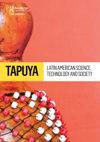A multi-scale perspective for assessing publishing circuits in non-hegemonic countries
IF 1
Q2 HISTORY & PHILOSOPHY OF SCIENCE
Tapuya: Latin American Science, Technology and Society
Pub Date : 2021-01-01
DOI:10.1080/25729861.2020.1845923
引用次数: 9
Abstract
ABSTRACT University Rankings and impact factor indicators were critical in the extension of the global belief in the intrinsic academic value of “World Class Institutions,” along with the international recognition of successful individuals forged through mainstream journals. However, these supposedly global standards were not adopted passively, nor massively, in the so-called periphery. Drawing from quantitative and qualitative studies of evaluative cultures in Latin America, particularly in Argentina, this paper observes various circuits of recognition and different paths for prestige-building. First, it discusses a multi-scale approach to national scientific fields highlighting heterogeneity in terms of the orientation of research agendas and styles of academic publishing. Evaluative cultures are examined as a complex set of instances of legitimation that provide room for maneuvering between global standards and local orders. Second, the paper delves into the role played by Latin America in forging an open access, non-commercial, regional publishing circuit with a dominant, but not exclusive, composition of journals from the social sciences and humanities. Finally, it argue that facing this dynamical publishing ecosystem developed in the public domain, national research assessment systems are alienated by incentives directed only to performance in mainstream publishing.非霸权国家出版电路评估的多尺度视角
大学排名和影响因子指标对于扩大全球对“世界级大学”内在学术价值的信念至关重要,同时也对通过主流期刊塑造的成功个人的国际认可至关重要。然而,这些所谓的全球标准并没有在所谓的外围国家被被动地、大规模地采用。通过对拉丁美洲,特别是阿根廷评价文化的定量和定性研究,本文观察到各种认可回路和声望建立的不同途径。首先,本文讨论了国家科学领域的多尺度方法,突出了研究议程取向和学术出版风格的异质性。评价性文化被视为一套复杂的合法性实例,为全球标准和地方秩序之间的操纵提供了空间。其次,本文深入探讨了拉丁美洲在建立一个开放获取、非商业、区域出版圈方面所发挥的作用,该出版圈以社会科学和人文科学期刊为主,但并非独占。最后,本文认为,面对这种在公共领域发展起来的动态出版生态系统,国家研究评估系统被只针对主流出版表现的激励所疏远。
本文章由计算机程序翻译,如有差异,请以英文原文为准。
求助全文
约1分钟内获得全文
求助全文
来源期刊

Tapuya: Latin American Science, Technology and Society
Social Sciences-Social Sciences (all)
CiteScore
1.60
自引率
0.00%
发文量
39
审稿时长
19 weeks
 求助内容:
求助内容: 应助结果提醒方式:
应助结果提醒方式:


